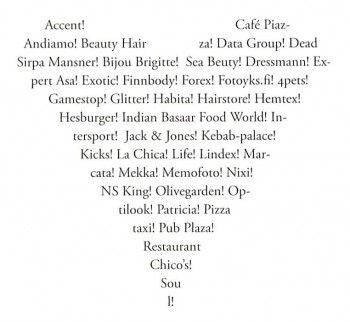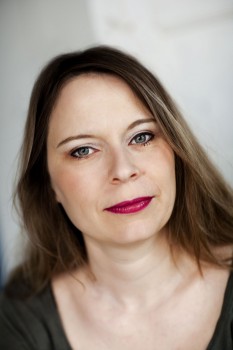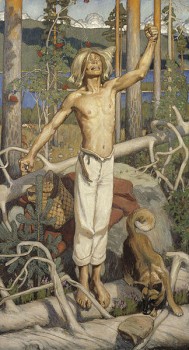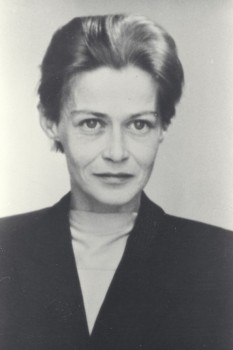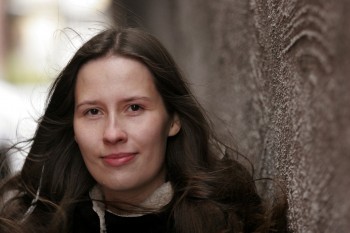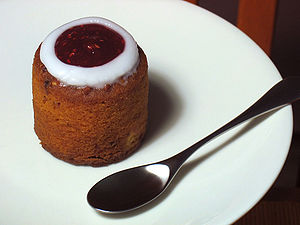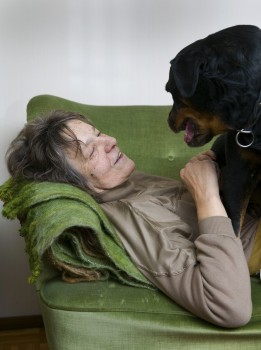Tag: poetry
Last flamenco in Seville
5 November 2010 | Fiction, poetry
The tragic story of a gypsy woman, famously transformed into an opera by Georges Bizet, inspired Saila Susiluoto to write about freedom in the contemporary world: her new collection of poems, entitled Carmen, is set in the shopping centre of an asphalt city. But is this classic femme fatale really a human being – or a cyborg, perhaps? Introduction by Teppo Kulmala
She was made of plastic strips, metal bits, artificial skin, implants, circuit boards. Her heart pumped blood like a real one, her eyes watered as necessary. She was made free and loving, and almost soulful. But the soul is a quirk, said the Creator, a human mistake causing pain and death. And confusion. And the degradation of this world. They left out what they couldn’t say, what they were unable to say. They said: your name is Carmen, go forth, find your balance on threads across the world, you are a meek machine, built to love everything except just one man. You are glowing wires, bright shiny strips of plastic, a mind made of images and tones, your step is light, go, go.
The mall’s scintillating youth choir
(gesticulating in the manner of a musical)
Opera of the everyday
5 November 2010 | Reviews
A plaza in Seville suddenly turns into a modern shopping mall in the new collection of poetry by Saila Susiluoto (born 1971). In Carmen (Otava, 2010) Susiluoto combines the elements of Georges Bizet’s eponymous 1875 opera – popular folk tradition and intense emotions.
The Carmen of these poems is a gypsy, a stranger, a femme fatale, a fiery augury of death. These terse poems combine a narrative continuum, a love story, the triangle drama of the opera, and Susiluoto’s own, distinctive visually flowing style, which is both fresh and familiar.
Her debut collection Siivekkäät ja Hännäkkäät (‘The Winged and the Tailed’, 2001) seems to exist within the frame of a narrative painting or a film. In this suburban story of human relations, she is both an individual growing in passions and her lover’s deserter. More…
One-night stand: an interview with publisher Leevi Lehto
17 September 2010 | Interviews
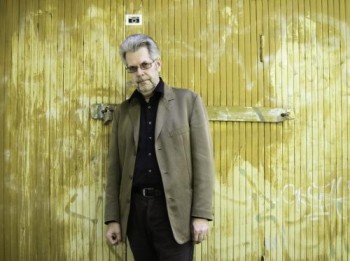
Leevi Lehto. Photo: Lotta Djupsund/Savukeidas
Founded by poet Leevi Lehto, ntamo is seen by many as the black sheep and enfant terrible of the world of Finnish publishing.
From its inception, ntamo (shortened from the word kustantamo, publishing company) has striven to subvert the familiar conservative models of publishing that audiences are used to.
Ntamo publishes books for small circulation, such as poetry and experimental prose. Its catalogue includes works both by celebrated writers, such as Kari Aronpuro, and by a whole host of authors making their literary debuts.
Lehto’s objective has been to publish as many books as possible, using a system of print on demand, and to have as little to do with the books’ content as possible. What’s more, ntamo’s publications are not marketed at all. Readers can find information on new publications by following the publisher’s blog [in Finnish only]. I met up with Lehto a while ago and we discussed ntamo’s current situation, new trends in the publishing world and the future of books and literature in general. More…
Kullervo: to be, or not?
10 September 2010 | Articles, Non-fiction
A young man is born a slave under stars that augur ill for him. He is maltreated and betrayed from birth. He cannot control his physical power, his aggression or his thirst for revenge and, finally, after fatal errors and deliberate acts of violence, his remaining desire is to die. What, in the end, did life hold for him?
The cruelly tragic story of Kullervo in the Kalevala was largely the creation of the national epic’s compiler, Elias Lönnrot (1802–1884), who put together a number of originally unconnected folk-epic fragments collected in disparate localities throughout the north and east of Finland. This process involved many stages and went on for decades. The first version was published in 1835; for a shorter version for schools in 1862 Lönnrot cut the most violent and erotic scenes – including those involving Kullervo and his sister in an incestuous encounter. More…
So close to me
19 August 2010 | Reviews
Please try this first, before we enter the chamber of horrors. It’s a poem by Timo Harju:
… The old people’s home is the strange hand of God with which he strokes
his thinning hair,
a sudden shower of cackling in the dry linen closet, slightly
sad and lonely
God looks out, stirring his cup of tea as if it were on fire.
If Jesus had lived to grow old and gone into an old people’s home,
he would have been like these.
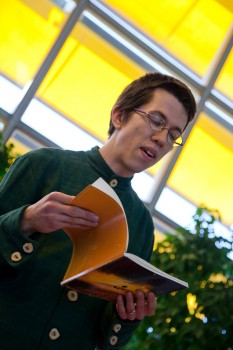
Timo Harju was awarded the 2009 Kritiikin kannukset prize (‘the spurs of criticism’, 2009) of the Finnish Critics' Association, SARV. Photo: Pia Pettersson
This spring a young Finnish female nurse was sentenced to life imprisonment for using insulin to murder a 79-year-old mentally retarded patient. Not long after, sentence was passed on another nurse – this time a meek and submissive-looking middle-aged woman who had murdered a whole series of elderly patients with overdoses of medication.
These are the terms – those of ordinary crime journalism – in which our recent public discussion of long-stay care of the elderly here in Finland was conducted. The discussion was followed by the usual misery of cuts, unchanged diapers, dehydration, over-medication, poor wages for hard work… No wonder that the concept of ‘healthcare wills’ and ‘living wills’, in which people are supposed to say how they want to be cared for in the last stage of their lives – is acquiring a disturbing undertone of ‘better jump before you’re pushed.’ More…
Memory in my hands
19 August 2010 | Fiction, poetry
A couple of years ago Timo Harju chose the non-military alternative to national service and was detailed to work at an old people’s home. Its director warned him that its inhabitants were ‘no sweet old grannies and grandpas’. Harju thought this might be a joke. In his first collection of poems, entitled Kastelimme heitä runsaasti kahvilla (‘We watered them abundantly with coffee’, Ntamo, 2009), he patiently gathers fragments of dreams and fears, memories and forgotten songs in the house of oblivion, treating them with gentle empathy. Commentary by Pia Ingström
Ward A5, Thursday
The clouds in the nursing home corridors, sky-open springlike after a bathe
and forgotten, in a frayed blue dressing-gown beside an osiery.
The grannies in the nursing home corridors, the last beautiful pride
you keep in a small wooden box behind your forehead:
if the lid opens by accident all the things may drop to the floor
topsy-turvy you won’t be able to find them, your back won’t let you
you won’t recognise them any more even if you do,
the springtime tears your insides to pieces.
Here they come, the grannies.
Better to stay here indoors, the journey to the dining room is a rough one
exposed like this
a long way and all by sleigh.
You stare at the keyhole: the clouds are coming. More…
Words like songs
The Finnish poet Helvi Juvonen (1919–1959) often studies small things: moles, lichen, bees and dwarf trees; she ‘doesn’t often dare to look at the clouds’. But small is beautiful; her nature poems and fairy-tales mix humility and the celebration of life. Commentary by Emily Jeremiah
Cup lichen
Luke 17:21
The lichen raised its fragile cup,
and rain filled it, and in the drop
the sky glittered, holding back the wind.
The lichen raised its fragile cup:
Now let’s toast the richness of our lives.
From Pohjajäätä [‘Ground-ice’], 1952) More…
Asking for more
14 April 2010 | Fiction, poetry
The heroines in Vilja-Tuulia Huotarinen’s new collection, Iloisen lehmän runot (‘Happy cow poems’, 2009), are timeless creatures, mythical and archaic, and yet our contemporaries, living their lives alongside us (see Ruminations)
Let the cows out on Monday
and they’ll enter the forest, wander far
aim for the waterfalls, the hole in the rock and down the precipice.
The dead come back along our the road to our yard:
Rebecca, Isolde, Rosamunda.
Allison, Eulalia, Euphrosyne.
Not as ghosts but as old friends.
Whom will they, the wingless ones, protect here?
A lean lass, a lean lass. More…
Let us eat cake
4 February 2010 | This 'n' that
Here at Books from Finland central we’re celebrating, with the one Finnish literary anniversary that involves its own dedicated cake.
The fifth of February marks the birthday of the poet J.L. Runeberg (1804–1877) – writer, among many other things, of the Finnish national anthem (actually unofficial, as there’s no mention of such a thing in the legislation), which he wrote in Swedish, Vårt land (in Finnish, Maamme). More…
Hamlet in blue velvet
22 January 2010 | Fiction, poetry
Physical, mythical, sensual, playful: Sirkka Turkka’s poems, never abstract, speak of life, death, dogs, horses, nature and humans. In her universe the humorous and the grave socialise without effort. These texts, in prose form, with Hamlet as one of the characters, are often set in a wintry landscape (see Nature girl)
Poems from Yö aukeaa kuin vilja (‘The night opens like corn’, Tammi, 1978)
Of his early childhood, Hamlet really only remembered his father’s slightly crooked and gnarled index finger, pointing at the lowest branch of a holly oak. A small owl sat on it. It can’t see anything, it’s asleep now. It won’t fly off until night. These were the only words Hamlet remembered his father saying to him during the first six years of his life. Later, all he saw of his father was his back, bent over in study of agricultural conditions in a village called Jawohl or of waterside traffic on the river Vistula at the turn of a particular century. When it came to governmental matters, the king placed his trust chiefly in his unconscious and in wheat bread, thick white slices of which he devoured from the moment he awoke. More…
On the waves of our skin
4 December 2009 | Fiction, poetry
The poems in Ilpo Tiihonen’s new collection, Jumalan sumu (‘God’s mist’) – about fakirs, beggars, poets, lovers and life – are tinged with a gentle sense of the ephemerality of human life (see Gatecrashing the universe)
Poems from Jumalan sumu (‘God’s mist’, WSOY, 2009)
SANTO PAN
These mornings when beggars
station themselves at church doors
and a little grace slips through
the fingers of some of us,
it seems for a moment good
That crows are flying about
and princes’ bones are clattering in huge sarcophagi
And now, with a basic shape planned
for the daily bread,
Early morning wakes up in Florence
with black flour in its fingernails More…

